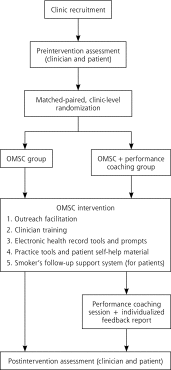From Good to Great: The Role of Performance Coaching in Enhancing Tobacco-Dependence Treatment Rates
- PMID: 30420364
- PMCID: PMC6231943
- DOI: 10.1370/afm.2312
From Good to Great: The Role of Performance Coaching in Enhancing Tobacco-Dependence Treatment Rates
Abstract
Purpose: The purpose of this study was to examine the incremental effect of performance coaching, delivered as part of a multicomponent intervention (Ottawa Model for Smoking Cessation [OMSC]), in increasing rates of tobacco-dependence treatment by primary care clinicians.
Methods: In a cluster-randomized controlled trial, 15 primary care practices were randomly assigned to 1 of the following active-treatment conditions: OMSC or OMSC plus performance coaching (OMSC+). All practices received support to implement the OMSC. In addition, clinicians in the OMSC+ group participated in a 1.5-hour skills-based coaching session and received an individualized performance report. All clinicians and a cross-sectional sample of their patients were surveyed before and 4 months after introduction of the interventions. The primary outcome measure was rates of tobacco-dependence treatment strategy (Ask, Advise, Assist, Arrange) delivery. Secondary outcomes were patient quit attempts and smoking abstinence measured at 6 months' follow-up.
Results: Primary care clinicians (166) and patients (1,990) were enrolled in the trial. Clinicians in the OMSC+ group had statistically greater rates of delivery for Ask (adjusted odds ratio [AOR] = 1.69; 95% CI, 1.05-2.72), Assist (AOR = 1.64; 95% CI, 1.08-2.49), and Arrange (AOR = 2.01; 95% CI, 1.22-3.31). Sensitivity analysis found that the rate of delivery for Advise was greater only among those clinicians who attended the coaching session (AOR = 1.65; 95% CI, 1.10-2.49; P = .02). No differences were documented between groups for cessation outcomes.
Conclusions: Performance coaching significantly increased rates of tobacco-dependence treatment by primary care clinicians when delivered as part of a multicomponent intervention.
Keywords: Ottawa Model for Smoking Cessation; audit and feedback; coaching; knowledge translation; primary care; quality improvement; randomized controlled trial; smoking cessation.
© 2018 Annals of Family Medicine, Inc.
Figures


References
-
- World Health Organization. WHO Report on the Global Tobacco Epidemic, 2008: The MPOWER Package. Geneva, Switzerland: WHO; 2008. http://www.who.int/tobacco/mpower/mpower_report_full_2008.pdf.
-
- World Health Organization. WHO Report on the Global Tobacco Epidemic, 2017: Monitoring Tobacco Use and Prevention Policies. Geneva, Switzerland: WHO; 2017. http://apps.who.int/iris/handle/10665/255874.
Publication types
MeSH terms
LinkOut - more resources
Full Text Sources
Medical
